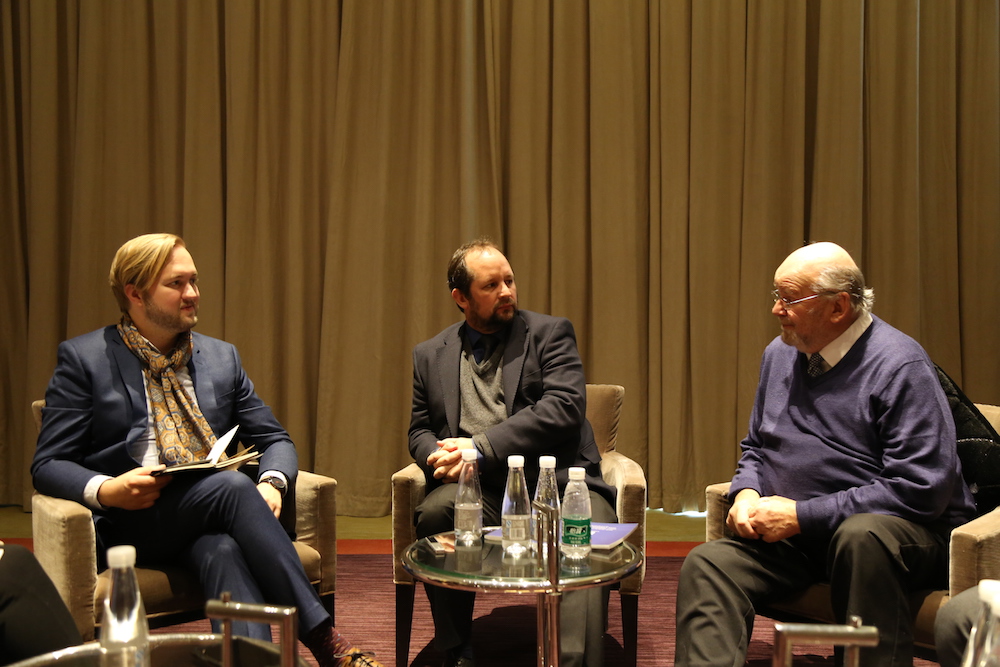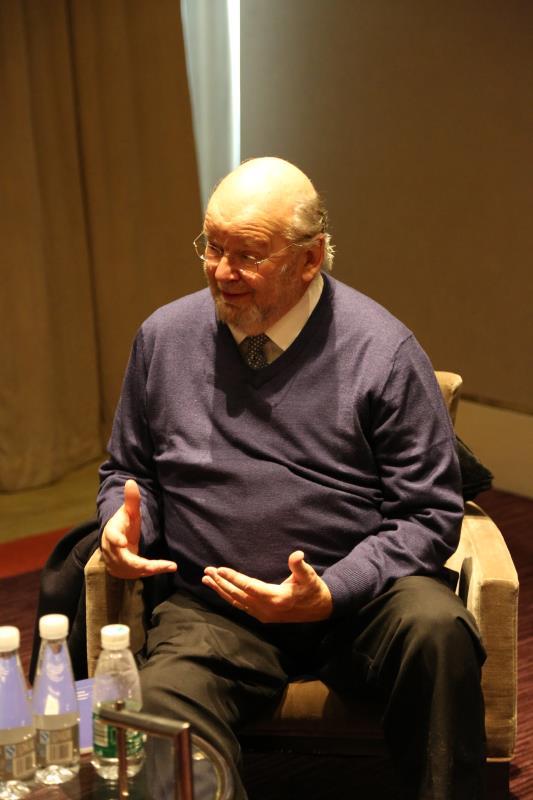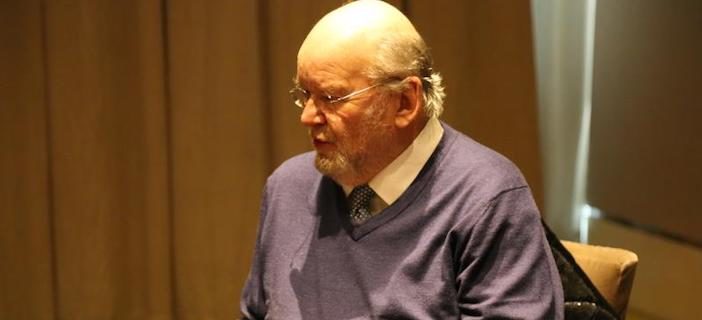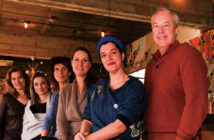HD Bilingual Schools are popping up all around China at an astounding rate, in cities like Ningbo, Qingdao, Shanghai, and as of 2017 in Beijing as well. We couldn’t be more thrilled about their vibrant addition to China’s educational landscape, and the prestige that comes along with their sister school affiliation to a school like Hurtwood House.
Hurtwood (HD UK) is regarded as being one of the most prestigious and academically rigorous educational institutions in the UK right now. With almost 50 years of experience refining their methods, they’ve carved out a niche for themselves as innovators in creative learning and teaching techniques, while also being a powerhouse in visual and performing arts study.
On January 13, beijingkids and JingKids had the pleasure of speaking with the founder of Hurtwood House, Richard Jackson, Headmaster Cosmo Jackson, and HD School partner Rick Johnson during their visit to the 2018 Beijing International School Expo.
It’s not often that we get the opportunity to have a dialogue with such individuals that have had such a major impact in the world of academia, so we leaped at the opportunity to pick their brains regarding the school’s founding, boarding life, and how they are prepping their students for a future that is full of uncertainties.

(From right to left): Richard Jackson, Cosmo Jackson, Kipp Whittaker
beijingkids: Was it your immediate goal to open a school that was different from the more orthodox ones that you probably grew up with or did it just happen organically through being a product of the progressive educational landscapes of the 70s?
Richard: Absolutely, it was always designed to be a different school, but modeled of course on the great academic traditions of an English education. But this was the 60s and 70s, and this was a time of great change in England. These were exciting times. As indeed I sense this is a time of change in China. Also, there was a new spirit in the air, and everything was changing socially. I feel that if it wasn’t me, then somebody would have sprung up and said; “we can do things a little differently, we can keep the best of the old, but maybe we can just nudge things along a bit in a different direction.” That seemed really important to me at the time. Everything seemed to be moving at the moment, but maybe the great educational system was just a little complacent and could do with a shove.
beijingkids: We’ve noticed that Hurtwood House is very much known for its programs in the performing and visual arts. Has this always been a focus and what other areas of your curriculum are you particularly proud of?
Richard: I think that the performing arts, in particular, delivers so much to the individual student. I’m talking about their ability to think creatively, their ability to develop initiative, and their ability to develop self-confidence.
I can remember, that there has always been a bit of resistance in England by fathers in particular who think, “I don’t want my son to go on the stage, I want him to be an engineer or an accountant,” and one father was struggling with this concept when we were doing a tour of the school, and we passed a student and asked him if he could explain to this nice gentleman why he was interested in theater studies and drama. He got up and said; “Do you want me to tell him about the curriculum or how it changed my life?”
So there are very few subjects that are life-changing in this respect. So I think the combination of academic rigor with the creative subjects, gives you a foundation for life. What is education? Is education just about these 18 years? Of course, it is about accessing the top universities, but it’s also about providing you with the equipment to cope with whatever a hostile world may throw at you over the next 80-years.
So that kind of ability, or the ability to think on your feet and to be creative, will help these people to become the captains of industry. They are going to be the decision makers and the leaders. So it’s always struck me that there is a form of education that breeds obedient followers, who sit in straight lines in the classroom and do what they’re told. At Hurtwood, we breed the leaders, the people who are going to give the orders, the people who are going to have the ideas, and that’s where the creative subjects come in. It’s not just theater studies in terms of art, textiles, music technology, and IT, there are many areas in which we’ve pushed forward and which we’ve valued.
Cosmo: I think that we are unique in our devotion to those creative subjects, but at the same time it’s the pillars of academic rigor that are allied to that creativity. So in terms of which department are we most proud of, yes the theater and the filmmaking departments but actually the mathematics department and the economics department. You know these are hugely important to us. More people at our school take maths as a subject, but understand in English education you have free choice. I’m sure that people in China would feel; “well surely you take maths!” You know it’s a given, but you have in Six Form a free choice, and you have a school that has a reputation, and you look at our literature, and you see a predominance of creativity throughout it, but actually beneath all of that, maths is by far the biggest and most important subject in the school, and that provides the foundation for so many of those university courses.
JingKids: When you’re recruiting your students from elsewhere, do you have a preference? Because you obviously put a focus on creativity, so are the kids favored if they are very talented in some way?
Cosmo: I personally meet every student, so I do the interviewing. That was something my father did for nearly 40-years, and to be honest we sit down and recruit the young kids that we like. When you’ve sat down and had a conversation with them, sometimes they are going to be incredibly academic business students of the future, sometimes they won’t be so academic, but they’ll have passions and flair for something. I don’t want everyone to be the same. If we had 350 identical students that would be terrible. So generally, we are looking for the passion and the enthusiasm in a student, and we are looking at their character.
Richard: And the contribution that they are going to make to the school. It’s a two-way process. We are going to contribute to them, but they also have to contribute to us.

Richard Jackson
beijingkids: Going further into this, we understand that Hurtwood is very popular among Chinese students looking to study abroad. How have you made your school more accommodating to international students?
Richard: I think there’s an irony here because we’re expecting someone to shift from their entire culture, to travel thousands of miles to move to an environment where they know nobody. It is staggering how well the Chinese students adapt. And, the irony is that we have English students who live within twenty minutes of the school and have been to boarding schools before, who find it more difficult. It is extraordinary, so we often find ourselves singing the praises of the Chinese, in particular for their ability to adapt very quickly to their new surroundings.
Cosmo: That’s also something I’m looking for in an interview. We don’t have an entrance exam for our Chinese kids, so I do interview about 500 Chinese students a year. I have at least 500 inquiries that I start with and must interview about 150-200, and I probably recruit about 25 each year. So, somehow I’m making some personal, instinctive decisions.
JingKids: You can also refer these students back to HD Schools in China now.
Rick: I think that’s very much part of the sisterhood as well and the whole concept of what we’re trying to do here. So if we were looking at the read-across between the two groups, the recruitment of teachers is a primary example of help that is being directly provided by us in the UK, but also the preparation of kids here in China at HD schools to make that transition much more relaxed and to give them a head start so that they can come ideally to Hurtwood.
beijingkids: As all of you have been involved in education for quite some time, what in your opinion makes a great School?
Richard: I think the most important thing for us has been establishing a genuine contact with each student. I also think that is the most difficult thing for a school to do, and the bigger the school, the more difficult it is to make sure you are reaching the student in the classroom and catering for their individual needs. So one of the things that we did from day one in our school which was different from any other school was to put in a very comprehensive system of weekly monitoring. Not only of the student’s academic grades but also how they were feeling and how they were settling in and contributing to the community. This has made a huge difference.
beijingkids: This system of constant student feedback must not be an easy thing to maintain, was this always a part of the Hurtwood model?
Richard: Right from day one. What I found upsetting as a parent was getting reports from schools saying another wasted term. So the feeling was why didn’t you do something about it, it’s a bit late to be telling me now? So the point was, let’s fix this as it can be fixed every five working days. I think again this process of engaging each person begins with that first interview with Cosmo. You sit down with the student on a sofa in our drawing room, and you establish a personal relationship with that student, and that personal relationship survives through the two years that they are at Hurtwood.
beijingkids: How would you say that Hurtwood is preparing students for a future that is full of uncertainties, especially regarding the job market?
Rick: This question also links back to the great school question. With the job market being uncertain, for kids going to school now and starting here at HD at age three-years-old, those jobs don’t even exist yet. So, 25 years from now, when they’re in their late twenties, they will be doing jobs that we don’t even know today what they will be. There will, of course, be doctors and lawyers and so on, but there will be whole sectors of industry that will be created over the next generation for and by these kids. If my child can graduate with options and with the ability to apply the learning that they’ve had in any way that comes out, then they’ll have a really good chance at being successful rather than being a direct line, singular product that just thinks in one particular driven way. They must have the ability to think right and left as well as ahead. That creativity which flows through the Hurtwood ethos again is all about being able to look left, right, straight ahead, and in fact behind.
JingKids: You are opening so many schools in China now, and I understand that the essence of British schools is their boarding system. But in China these schools aren’t always necessarily boarding schools, do you think it needs to be?
Cosmo: I don’t think it has to be. There’s an essence that is delivered through the boarding, but it can also be done through the daily experience. I think the moment that you remove the child one stage further from their parents, at whatever age is appropriate, then suddenly they have to learn how to stand on their own two feet. I think going back 50-years in British education (in reference to “The Crown”) is that if you made life really unpleasant for these students, then they became men. That worked for some people, but it broke a few people I think in the process. So, we’re not trying to break people.
Rick: There is boarding at both HD Ningbo and Qingdao, in the same way, that it is at Hurtwood, and the concept that boarding in our environment is very much an educational process. In part, the education continuity of teachers being in the classroom, on the sports field, and then in the boarding house putting kids to bed at night, and you get to see children in a completely different environment throughout your day. If we get to learn how to unlock them, or how to motivate them so that when you go back into the classroom the following day, and you see a child is not perhaps responding as well, maybe you can use another technique that you saw on the sport field or in the boarding house to motivate the child to learn a bit better. That is the concept of our pastoral care system; it’s not about accommodation or a nannying environment. It is very much an educational process, and it is very much a community.
beijingkids: How do you think that education has changed and will change, and are there any examples of Hurtwood driving innovative education practices?
Richard: We talked about never being complacent and moving on. I think there’s a lot of work which we do at the moment, studying the whole process of teaching and learning. What makes a good teacher? What makes a good learner? How do these processes work? How long can a student concentrate for in the classroom? What’s the best method of reaching them? I think that all schools now share their best teaching practices amongst their staff. None of this was happening 10-20 years ago.
Photos: Courtesy of HD




